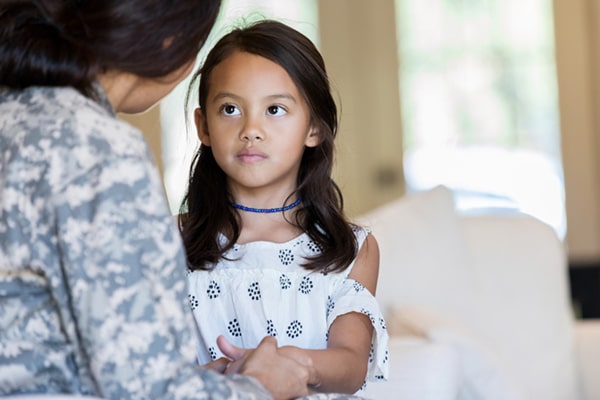- Center for Children and Youth
- Grief & Bereavement
- Parenting
By Brittney Reiser, AMFT, Child Therapist at JFCS’ Center for Children and Youth
Receiving a positive COVID-19 test in your family or community can be frightening for adults and children alike. Young children, who may not fully understand what this diagnosis will mean for them or their loved one, might ask questions like “Am I going to die?” or “When can I see grandma?”

These questions may be painful to hear and difficult to answer. Parents and grandparents are likely managing their own anxiety, confusion, and uncertainty that comes along with a COVID diagnosis as well.
Here are 5 strategies to help clarify the situation and reassure your children:
- Have an open conversation. We want to make sure we are listening as much as we are giving information to our children: our goal is to hear what they have to say and how they feel. As a parent or grandparent, feel free to share how the COVID diagnosis makes you feel as well—while reassuring your child that you’re doing your very best to keep everyone in your family safe and healthy.
- Use language kids can understand. When speaking with your children, remind yourself of not only their chronological age but their developmental age as well. How can you present the information to your child so that it makes sense to them? If you have very little ones, you can try a puppet show or acting out a conversation with figurines.
- Watch what you say to others. By now you might already know that kids are like sponges (remember that time they repeated something you said, when you didn’t even know they were listening?). It is important to stay consistent with not only your messaging directly to your children, but also when you are talking to others. If these messages are different, your child may be feeling confused.
- Reassure them. It often helps to stick to the facts—explain to your child that there is a range of ways people can be affected by the virus. According to the CDC, only a small percentage of people develop serious problems. Remember to stay calm and reassure yourself, too—kids are often masters of picking up on how we are feeling.
- Note if your child’s level of anxiety requires clinical attention. If your child’s anxiety is interfering with day-to-day tasks, even with parents’/grandparents’ reassurance, they may need support from a professional. Look out for sudden sleep issues, physical symptoms like headache and stomachache (not due to medical issues), decreased enjoyment in things they used to love, or spending more time alone.
If your family needs support during this time, JFCS’ Center for Children and Youth is here to help! Our team of experienced clinicians and parent educators provide expert mental health services for kids and teens as well as consultations and coaching for parents.
Don’t hesitate to reach out today. Call 415-359-2443 or visit ccy.jfcs.org.
JFCS’ Center for Children and Youth is made possible by generous donations, fees, JFCS Named Endowment Funds, and the leadership support of Dr. Kathy Fields-Rayant and Dr. Garry Rayant, Friend Family Foundation, Alex Ingersoll and Martin Tannenbaum, Parasol Foundation, Jay and Rose Phillips Family Foundation of California/Terry and John Levin, Lisa Stone Pritzker Family Foundation, Sandra L. Schnitzer Resilience Fund, Shmunis Youth Internship Fund, Shupin Fund for Youth, and Taube Foundation for Jewish Life & Culture/Dianne and Tad Taube, Harold and Libby Ziff Foundation/Lela and Gerry Sarnat
Special support for this community-wide initiative is also provided by the Koret Foundation.
To learn more about JFCS’ services to our community or to support JFCS’ Center for Children and Youth please contact Barbara Farber at [email protected] or 415-449-3858.
